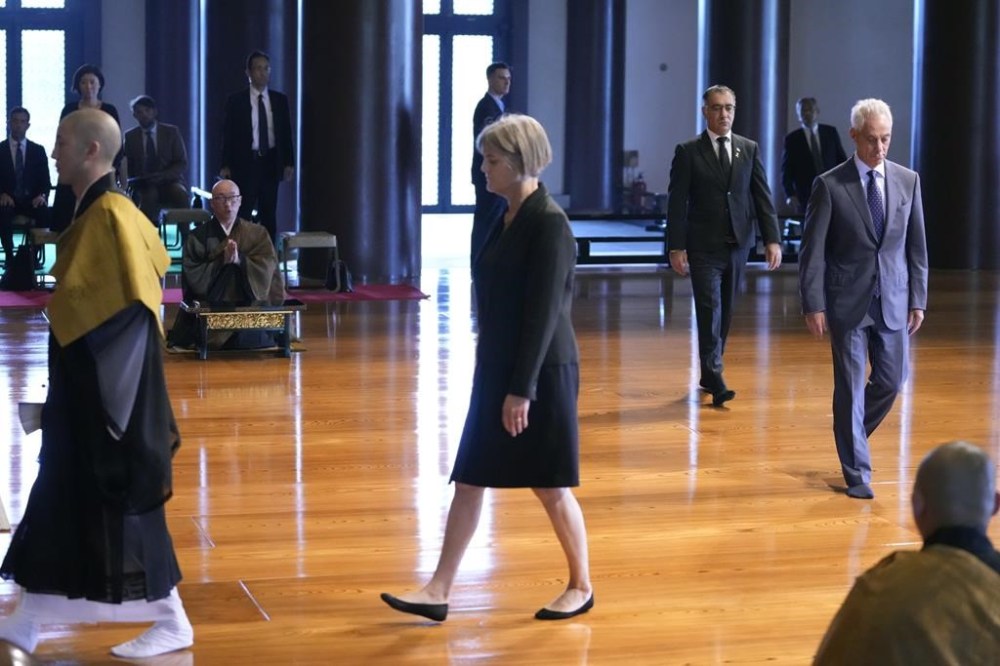Nagasaki marks 79th A-bomb anniversary without U.S. and other ambassadors after excluding Israel
Advertisement
Read this article for free:
or
Already have an account? Log in here »
To continue reading, please subscribe:
Monthly Digital Subscription
$0 for the first 4 weeks*
- Enjoy unlimited reading on winnipegfreepress.com
- Read the E-Edition, our digital replica newspaper
- Access News Break, our award-winning app
- Play interactive puzzles
*No charge for 4 weeks then price increases to the regular rate of $19.00 plus GST every four weeks. Offer available to new and qualified returning subscribers only. Cancel any time.
Monthly Digital Subscription
$4.75/week*
- Enjoy unlimited reading on winnipegfreepress.com
- Read the E-Edition, our digital replica newspaper
- Access News Break, our award-winning app
- Play interactive puzzles
*Billed as $19 plus GST every four weeks. Cancel any time.
To continue reading, please subscribe:
Add Free Press access to your Brandon Sun subscription for only an additional
$1 for the first 4 weeks*
*Your next subscription payment will increase by $1.00 and you will be charged $16.99 plus GST for four weeks. After four weeks, your payment will increase to $23.99 plus GST every four weeks.
Read unlimited articles for free today:
or
Already have an account? Log in here »
Hey there, time traveller!
This article was published 09/08/2024 (458 days ago), so information in it may no longer be current.
TOKYO (AP) — Nagasaki marked the 79th anniversary of its atomic bombing at the end of World War II at a ceremony Friday eclipsed by the absence of the American ambassador and other Western envoys in response to the Japanese city’s refusal to invite Israel.
Mayor Shiro Suzuki, in a speech at Nagasaki Peace Park, called for nuclear weapon states and those under their nuclear umbrellas, including Japan, to abolish the weapons.
“You must face up to the reality that the very existence of nuclear weapons poses an increasing threat to humankind, and you must make a brave shift toward the abolition of nuclear weapons,” Suzuki said.

He warned that the world faces “a critical situation” because of Russia’s invasion of Ukraine and accelerating conflicts in the Middle East.
The atomic bomb dropped by the United States on Nagasaki on Aug. 9, 1945, killed 70,000 people, three days after the bombing of Hiroshima killed 140,000. Japan surrendered on Aug. 15, 1945, ending World War II and its nearly half-century of aggression across Asia.
Speaking at Friday’s ceremony, Prime Minister Fumio Kishida reiterated his pledge to pursue a nuclear-free world. His critics, many of them atomic bomb survivors, or hibakusha, say it’s a hollow promise as Japan relies on the U.S. nuclear umbrella while building up its own military.
At 11:02 a.m., the moment the plutonium bomb exploded above the southern Japanese city, participants observed a moment of silence as a peace bell tolled.
More than 2,000 people, including representatives from 100 countries, attended Friday’s ceremony. But ambassadors from the U.S. and five other Group of Seven nations — Canada, France, Germany, Italy and the U.K. — and the European Union were absent. Their governments sent lower-ranking envoys in response to Suzuki’s decision not to invite Israel.
They said that treating Israel like Russia and Belarus, which also were not invited, was misleading.
U.S. Ambassador Rahm Emanuel instead attended a ceremony at a Buddhist temple in Tokyo honoring the Nagasaki atomic bombing victims, joined by his Israeli and British counterparts, Gilad Cohen and Julia Longbottom.
“We are obviously in Tokyo but that doesn’t mean we don’t have a responsibility to think and to reflect and to remember” what happened 79 years ago in Nagasaki and Hiroshima, Emanuel said.
Suzuki denied that his decision to exclude Israel was political, and said he feared that possible “unforeseeable situations” such as violent protests over the war in Gaza might disrupt the ceremony. Suzuki, whose parents are hibakusha, said the Aug. 9 anniversary is the most important day for Nagasaki and must be commemorated in a peaceful and solemn environment.
Emanuel disagreed.
“I think it was a political decision, not one based on security, given the prime minister’s attendance,” which required high security, Emanuel told reporters.
He said excluding Israel drew “a moral equivalency between Russia and Israel, one country that invaded versus one country that was a victim of invasion,” and that “my attendance would respect that political judgment, and I couldn’t do that.”
Cohen, in a statement on the social media platform X, expressed his “gratitude to all the countries that have chosen to stand with Israel and oppose its exclusion from the Nagasaki Peace Ceremony. Thank you for standing with us on the right side of history.”
The anniversary comes shortly after the United States and Japan reaffirmed the U.S. commitment to provide “extended deterrence” under its nuclear umbrella for Japan amid growing tension in the region. That is a shift from Japan’s previous reluctance to openly discuss its protection under the nuclear umbrella as the world’s only country to have suffered atomic attacks.

